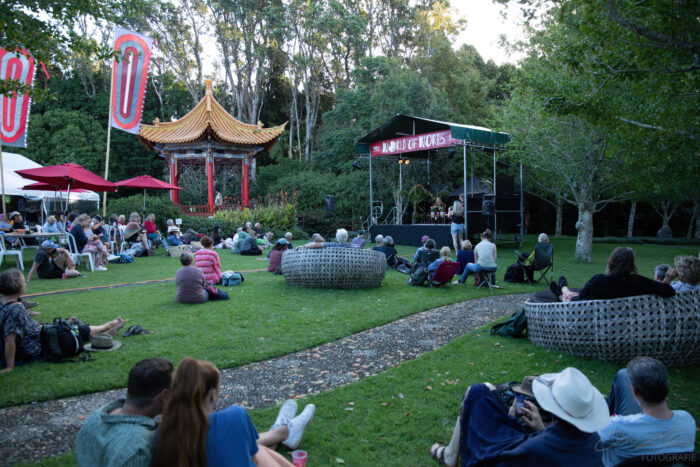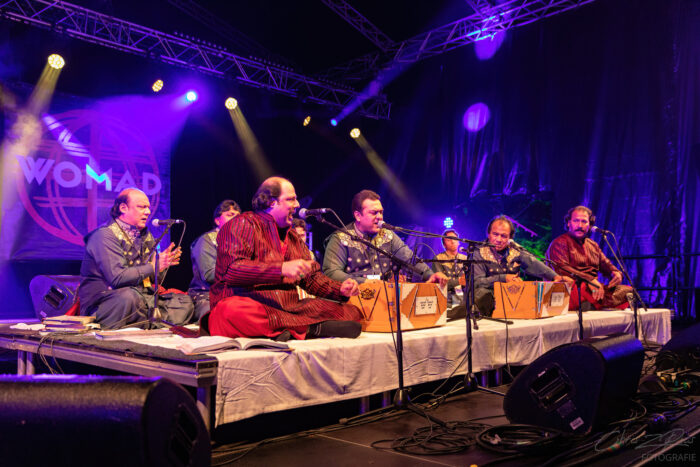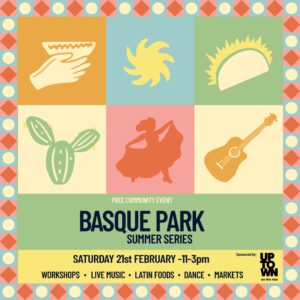WOMAD – Brooklands New Plymouth, 17-19 March 2023: Concert Review Part One
WOMAD – the World of Music, Art and Dance is celebrating it is twentieth year in New Plymouth. The music of the last one and a half days has been nothing short of brilliant. Womad has been in hiatus since 2020, following the Covid panic.
I attended the last one in March 2020. A few days later the lockdown descended, and the dark cloud enveloped humanity. At the time we believed we had escaped and the artists were celebrating for all the gathered that year.
It has been a bad dream since then, especially for musicians, who suffered from the abrupt cessation of their livelihood. But more so, it is their soul and passion. Their life force and ours too.
Elaha Soroor and Kefaya
 This was summed up poignantly and tragically by Elaha Soroor, playing with Kefaya. Soroor is a young female musician who became a celebrity in her home country Afghanistan, on a reality TV show called Afghan Stars. She resembles Bjork physically and reminds me of Chinese pop star Sa Dingding in vocal style.
This was summed up poignantly and tragically by Elaha Soroor, playing with Kefaya. Soroor is a young female musician who became a celebrity in her home country Afghanistan, on a reality TV show called Afghan Stars. She resembles Bjork physically and reminds me of Chinese pop star Sa Dingding in vocal style.
She sings traditional folk songs and has been outspoken on women’s lack of freedoms in her country under Taliban rule. She is in exile in London, which is where she met the loose collective of European musicians called Kefaya. This weekend in New Zealand, they comprise a trio of Al MacSween, Guiliano Modarelli and Joost Hendricks.
The traditional Afghan songs are given a modern western indie pop twist, especially with electronic synth effects.
Then we are told the Taliban hate music and smash musical instruments. They hate women and ban them from an education. They hate sport too, and their international teams are in exile. She includes an emotional plea for support.
Politics and freedom from oppression has always been something the artists appearing in WOMAD take pains to highlight, and the audience who attend over the years are attune to this.
Rizzwan-Muazzam Qawwals
Music at its absolute peak can transcend this and Rizzwan-Muazzam Qawwals achieve such in spectacular fashion. Rizzwan and Muazzam Ali Khan are brothers and the nephews of the legendary singer of Sufi music Nusrat Fateh Ali Khan.
The nine-piece band are from the Taliban’s neighbours, Pakistan. Two of the most fraught and politically sensitive nations on the planet. Qawwali music reaches beyond this with poetry that become lyrics. They focus on spiritual devotion and love.
The band have set out to carry forward the legacy of the brother’s celebrated uncle. That family tradition has been happening for generations with the Ali Khans.
Love and devotion can reach the same state of ecstatic release through a careful build up of the song cycle. The classic structure is three lead singers with one acting as team leader. Five singers make the second tier, fill the spaces left and add counterpoint to the three leads. Handclaps are integral to this. A tabla player centres the rhythmic drive, and two harmoniums swap between drone and support melody.
To experience this live is to feel the power of the infinite. Where the soul of man never dies as Sam Phillips described his favourite artist at Sun studios, Howling Wolf.
Nusrat Khan also said once in an interview It also takes power for the listener to appreciate this. Boundaries are broken and consciousness has no limits. The best and the worst of the human condition is in this part of the world.
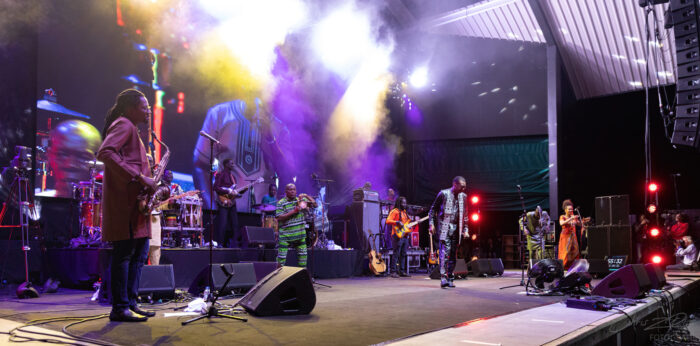
Youssou N’Dour & Le Super Etoile de Dakar
Feature act on the main Brookland Bowl stage at 10.15pm is the equally celebrated Youssou N’Dour and his band Le Super Etoile de Dakar. The Great Stars of Dakar.
His family were Sufi musicians. He gained international fame when he was championed by Peter Gabriel, a founder of WOMAD and World Music. He evolved a style of music over the years called mbalax, which blends a wide variety of continental African styles with Cuban, rock’n’roll, Latin, Brazilian and pop.
It’s all presented tonight with a large ensemble group of 13 or 14. There may be at least one dual personality.
Two drummers, two percussionists, a saxophone, a trio of guitars and electric bass, two backing singers, two keyboard players and N’Dour himself. It is stacked and packed, and yet there is no over-playing clutter. It fits as seamlessly as a James Brown revue, and just as disciplined.
A male dancer whirls and throws himself around the stage with absolutely no sense of any personal injury. In sync with the music, amazingly.
First two songs take 15 minutes. The band can stretch out and time becomes irrelevant. N’Dour looks a little like Bobby Womack, is an inspirational lyricist like Curtis Mayfield, but with more his early partner Jerry Butler’s vocal style and range.
Like Butler he became politically active. He has been a United Nation’s Goodwill Ambassador. Also served as Senegal’s Minister of Tourism and Culture.
It’s no mean feat to get the whole audience on the big hill to dance the shake and shimmy.
Towards the end he sings about happiness. He gives the famous black power salute that Black American athletes Tommie Smith and John Carlos gave when winning the men’s 200 metre race at the 1968 Olympics in Mexico City.
Bela Fleck and Abigail Washburn
Don’t think that American artists are shunned. Bela Fleck and Abigail Washburn are banjo specialists and a marriage partnership as well. There were many people like me literally falling at their feet.
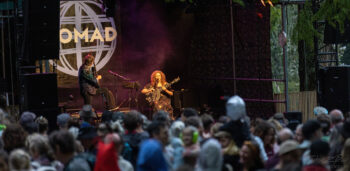 Fleck is a virtuoso, collaborated with many of the top bluegrass performers, and is a multiple Grammy winner. Washburn plays a claw-hammer style banjo (like Uncle Dave Macon) and branches out into other genres with a total free will.
Fleck is a virtuoso, collaborated with many of the top bluegrass performers, and is a multiple Grammy winner. Washburn plays a claw-hammer style banjo (like Uncle Dave Macon) and branches out into other genres with a total free will.
An instrumental song he wrote called New South Africa is free to roam and stitches in bits of Cumberland Gap and Pretty Polly. It is here you hear the parallel to the be-bop jazz musicians. Fast and furious whilst keeping the melody line intact and beautiful.
Washburn adapted a song from a Chinese folk tune and sings it in Mandarin. Does an impressive flat-foot clog dance to Take Me Back to Harlan. A voice that can pierce you when she suddenly unleashes.
What World music and the WOMAD experience has revealed is the spiritual presence of the Elders. The ancient practitioners of music as it is passed down multiple generations until it becomes a codified practice with a deep spiritual presence. The shaman and the medicine man.
Justin Adams and Mauro Durante
Justin Adams talks about this. He’s a British blues guitarist, songwriter and producer. Worked with the likes of Tinariwen and Sinead O’Connor. He has been a member of Robert Plant’s band, the Sensational Shapeshifters.
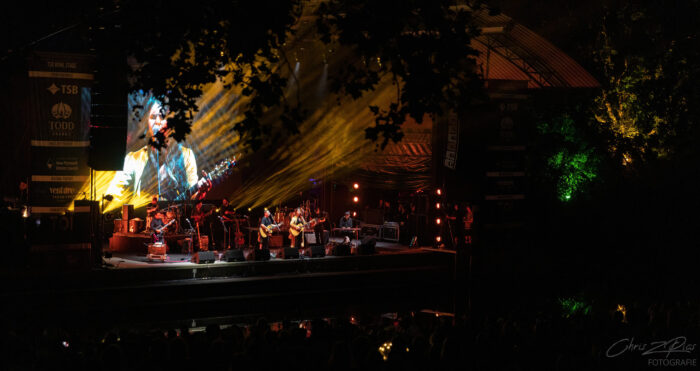 He is in recent collaboration with Mauro Durante. A violinist and drummer who plays in the pizzica style, a characteristic of Southern Italy where he hails from.
He is in recent collaboration with Mauro Durante. A violinist and drummer who plays in the pizzica style, a characteristic of Southern Italy where he hails from.
There was a kindred spirit recognised in their collaboration. Adams plays a mean gut-bucket blues with the characteristic amp distortion of a jook joint. At times he sounds like he’s playing a diddy bow single-string electric nerve guitar. Durante accompanies on a frame drum and violin.
Adams also has a deep interest in North African music, and the tradition of the griots. He identifies a djinn spirit, a genie if you like. The old traditions of shared music create powerful forces. In the American blues, it’s the mojo hand. Black cat bones and a Little John the Conqueroo.
Adams tells us that when musicians tap into these ancient forms, they transcend boundaries of time and space. A drone pattern can manifest and you remain in a glorious present which consumes the audience as much as the players.
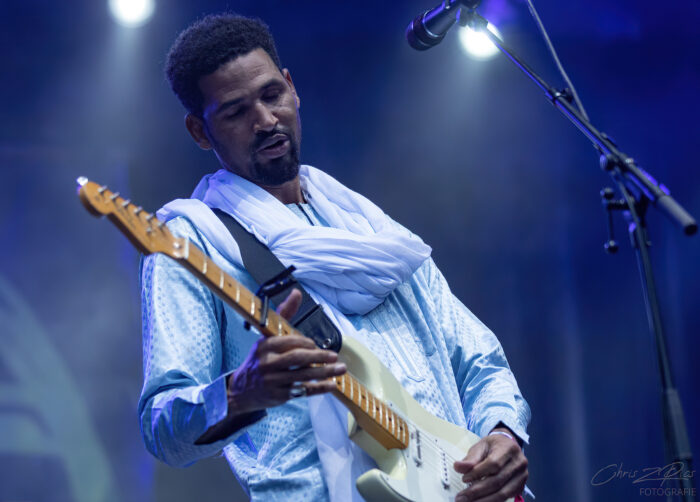
Mdou Moctar from Niger demonstrated this with his love of Eddie Van Halen’s incendiary guitar matched with the Tuareg tradition of his home.
He’s a leftie like Hendrix and eventually we got to near elemental noise like Voodoo Chile. With him the bass player is a solid wall like Dee Dee Ramone, and the drums play deep afro tribal beats, well outside rock music.
He’s also wearing striking purple robes whilst the band is all in gold.
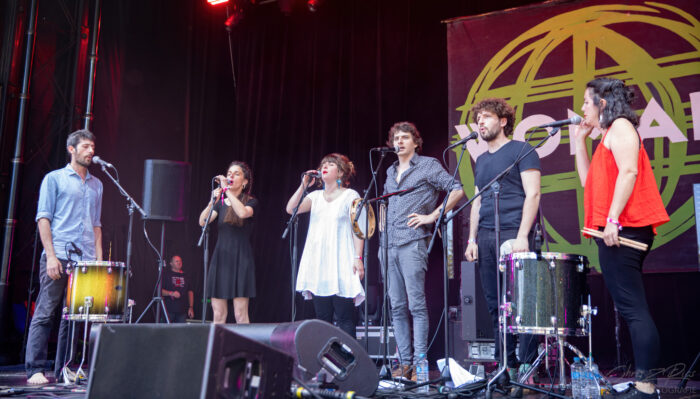
San Salvador is a province inside France. The six-piece band of that same name take a deep dive into the local folk tradition and fashion trance music which dissolves any boundaries of time, old or new.
Three women can sound like the Mystere de Voix Bulgare. Three men chant and lay down marching beats on single drums.
One song sounds so much like the Strangelove’s I Want Candy that you lose your bearings. In a good way.
The music of the Elders, the Ancient Ones, the Shaman continues to draw power and transcend when practised by great musicians who can tap into it.
Music is not bound by genre or time. It was not better in the Sixties more than any other time. Pop music is just as serious as avant-garde jazz.
The people who attend WOMAD in this country are the Boomers still. The old hippies, the spiritual practitioners, alternative lifestylers, the organic food devotees, the Greenies. Their children and grandchildren also are here.
To fully appreciate the spirit, it is best to spend the three days here in the magical botanic gardens. To experience the WOMAGIC.
What may today, the last day bring? The final act is Rizwan-Muazzam Qawwals, which is going to be amazing.
